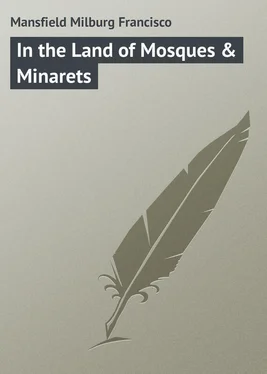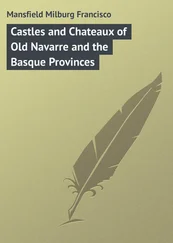Milburg Mansfield - In the Land of Mosques & Minarets
Здесь есть возможность читать онлайн «Milburg Mansfield - In the Land of Mosques & Minarets» — ознакомительный отрывок электронной книги совершенно бесплатно, а после прочтения отрывка купить полную версию. В некоторых случаях можно слушать аудио, скачать через торрент в формате fb2 и присутствует краткое содержание. ISBN: , Жанр: foreign_prose, Путешествия и география, на английском языке. Описание произведения, (предисловие) а так же отзывы посетителей доступны на портале библиотеки ЛибКат.
- Название:In the Land of Mosques & Minarets
- Автор:
- Жанр:
- Год:неизвестен
- ISBN:http://www.gutenberg.org/ebooks/46705
- Рейтинг книги:5 / 5. Голосов: 1
-
Избранное:Добавить в избранное
- Отзывы:
-
Ваша оценка:
- 100
- 1
- 2
- 3
- 4
- 5
In the Land of Mosques & Minarets: краткое содержание, описание и аннотация
Предлагаем к чтению аннотацию, описание, краткое содержание или предисловие (зависит от того, что написал сам автор книги «In the Land of Mosques & Minarets»). Если вы не нашли необходимую информацию о книге — напишите в комментариях, мы постараемся отыскать её.
In the Land of Mosques & Minarets — читать онлайн ознакомительный отрывок
Ниже представлен текст книги, разбитый по страницам. Система сохранения места последней прочитанной страницы, позволяет с удобством читать онлайн бесплатно книгу «In the Land of Mosques & Minarets», без необходимости каждый раз заново искать на чём Вы остановились. Поставьте закладку, и сможете в любой момент перейти на страницу, на которой закончили чтение.
Интервал:
Закладка:
It is the opinion of that indefatigable traveller and student of exotic things, Edmond de Amicis, that the Arab concedes nothing to the European in his chivalrous treatment of woman. “No Arab dares lift an offending hand against a woman in public.” “No Arab soldier, even in the tumult of attack, would think of maltreating even the most insolent of womenkind.” And yet Europeans of most nationalities have been known to do both these things.
In her cloister, or to be more exact, in her boudoir, the Arab woman, and particularly the mother, receives the most respectful homage and solicitude from all the household. According to the Koran the children are admonished to respect the persons of those who bore them, and a verbal declaration of the Prophet is set down as: “A child may gain Paradise only by following in the footsteps of its mother.”
The educated and advanced Arabs of the towns have done much to disabuse the public of any false preconceived ideas concerning Arab womenfolk. Contrary to common belief the Arab woman is often the intellectual and social equal of her spouse. It was only the absurd jealousy of the old-school Mussulmans that annihilated for ever the faculties of their wives.
The portrait gallery of celebrated Mussulman women is not large, but one does not forget Zobeïdah, who inspired and aided the illustrious Haroun-Al-Rachid. Islam is not in its decadence, but its sponsors are awakening to the fact that they must keep abreast of the times.
The Friday promenade of the Mussulman woman of the towns to the cemetery is her only outing, the only day off allowed her. She makes as much of it as possible, but it is a sad proceeding at best.
The Arab tomb is, generally speaking, a thing of simplicity, a simple slab bearing the Arab words for the sentiment “ Hic jacet .” The exception is in the marabout tombs or koubas , which are often monumental, though of comparatively small dimensions, well built, symmetrical, and surmounted by a dome or cupola.
The word marabout signifies first of all a holy man of the Mohammedan sect, a réligieux in fact, one whose vows, life and service is devoted to his God. Furthermore the same word is applied to the tiny mosque-like tombs distributed throughout the Arab peopled lands, which are served by a marabout . The two entities have become somehow indistinguishable as to name.
The mosque-marabout is practically a tiny house of worship, its four box-like walls surmounted by one great dome or others smaller, with never, never a minaret, the invariable adjunct of a full-grown mosque. The quaint, kindly welcome of the marabout of Algeria and Tunisia will long remain in the memory of those who have come under its influence, as did the author in the course of some months’ sojourn in a little desert oasis, peopled only by indigènes and the small garrison of a French military post. An excursion to visit the marabout in his humble dwelling, some kilometres away under another little clump of palm-trees, was an almost weekly occurrence. Conversation was difficult, but we all sat and looked at each other and made signs, and nodded, and clasped hands, and again nodded a farewell, the white-clad marabout’s kindly, bearded face lighting up meanwhile as if in appreciation of the glimmer of light from the outside world which had filtered through to his tranquil abode. Nothing ever more belied the words of a proverb than a marabout. The French have a remark in which he is made out an ugly, uncouth man: “ Affreux comme un marabout .” The illustration herewith belies these words.
If you are a clergyman of the Christian church, and there are many “conducted tourists” of that order in Algeria to-day, you need have no hesitancy in making your profession of faith known to the marabout. Say simply that you are a “ marabout d’Aïssa .” He will recognize and respect your religion, which is more than the Confucian or Buddhist will, who simply rolls his tongue in his cheek and smiles blandly. The Mohammedan’s religion is a very plausible and a very well-working one. He has no false gods or idols. That’s a good thing of itself. And superstition plays a very small part therein. That’s another good thing. The marabout is not a Mussulman priest, but a member, merely, of a religious order, – a monk virtually, and, as there are communities of monkish orders elsewhere, there are also whole tribes in Africa composed entirely of marabouts. They are looked up to by the Mussulman faithful as shepherds of the flock in the absence of a specially credentialled priest or father.
The marabouts are most numerous in Morocco, Algeria and Tunisia, though their vocation properly belongs to the entire Mussulman religion.
A whole tribe of the sect of marabouts, under the pretext of wishing to be free to practise their rites away from worldly contaminating influences, voluntarily exiled themselves centuries ago in the Atlas range bordering the northern limits of the Sahara. This was in 1050. From this procedure these religionists grew to such power and influence that they became virtually political rulers as well. They conquered the kingdoms of Fez and Morocco, and even sought to conquer Spain, emigrating to the southern peninsula in vast numbers, only to be chased from there to seek a refuge in Majorca, which they were able to do because of the bounty of the Mussulman King of Cordova, to whom the suzerainty belonged. Here they were known under the name of Almoravides , and to them was due the invention of the Spanish money known as maravédis .
The marabout is caricatured a little, too, in the name given to a fat-bellied copper coffee-pot frequently met with in the Mediterranean countries. Balzac describes the batterie de cuisine of one of his characters as consisting of un chaudron, un gril, une casserole et trois marabouts .
One of the greatest Mussulman saints, and the one who is the most frequently invoked, was Sidi-el-Hadji-Abd-el-Kader-el-Djilali. His tomb is at Bagdad, but all Algeria is strewn with koubas in his honour. He is particularly the patron saint of the blind, but the lame and the halt invoke his aid as well, for he has the reputation of being the most potent and efficacious of all Mussulman saints. A marabout is generally in charge of these koubas , as he is with the proper tombs of other holy men. The marabout tombs, the koubas and the mosques are all Mussulman shrines of the same rank so far as their being holy, sanctified places is concerned.
The pilgrimage to Mecca from all Mohammedan lands is the event of their lives for the faithful who participate therein. The pilgrims going from Algeria and Tunisia are yearly becoming greater in numbers. It is as queer a composite caravan as one has ever seen which lines up at the wharves of Bona or Sfax, there to take ship for the East. By this time it has ceased to be a caravan, and has become a personally conducted excursion. The return is quite as impressive as the departure. It is then that a sort of cantata is sung or chanted, running something like the following: —
First the waiting folk on shore shout out, —
Then the pilgrims reply: —
“O pilgrims from the house of God
Hast thou seen the Prophet of God.”
Then the pilgrims reply: —
“We have seen! We have seen!
And we have left him in the House of God:
There he makes his devotions,
There he reads his holy books.”
The marabouts then endorse it all, —
“Our Seigneur Abraham is the beloved of God,
Our Seigneur Moses is the mouthpiece of God,
Our Seigneur Aïssa 1 1 The name the Arabs give Jesus Christ.
is the spirit of God,
But our Seigneur Mohammed is the Prophet of God.”
Интервал:
Закладка:
Похожие книги на «In the Land of Mosques & Minarets»
Представляем Вашему вниманию похожие книги на «In the Land of Mosques & Minarets» списком для выбора. Мы отобрали схожую по названию и смыслу литературу в надежде предоставить читателям больше вариантов отыскать новые, интересные, ещё непрочитанные произведения.
Обсуждение, отзывы о книге «In the Land of Mosques & Minarets» и просто собственные мнения читателей. Оставьте ваши комментарии, напишите, что Вы думаете о произведении, его смысле или главных героях. Укажите что конкретно понравилось, а что нет, и почему Вы так считаете.












